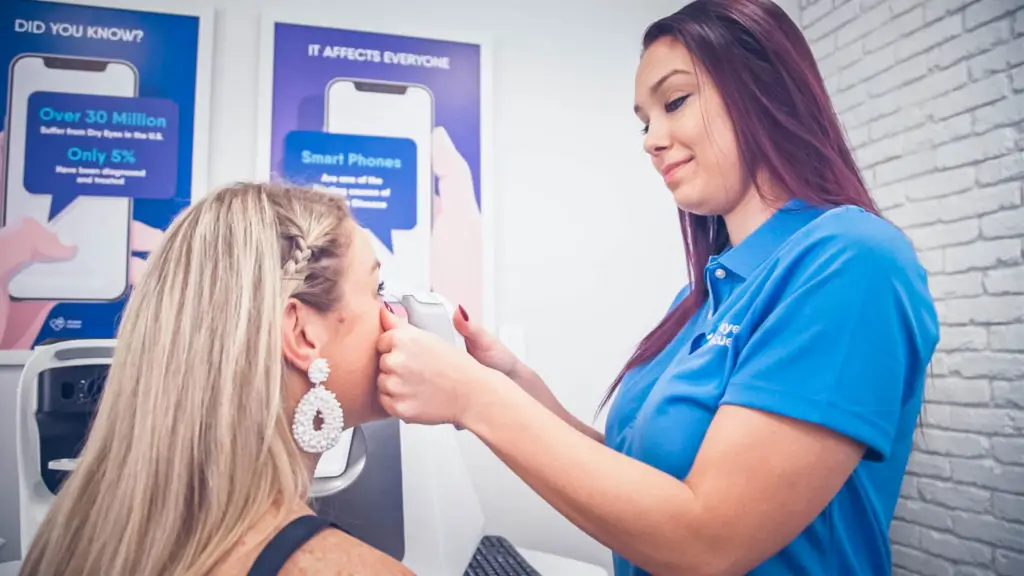
Regular eye exams are important for maintaining good eye health and detecting any potential problems early on. If you wear contacts, it is important to inform your eye doctor about them during your exam. This is because contacts can affect the shape of your cornea, which can potentially impact the accuracy of your prescription.
During your exam, your eye doctor may perform a test called keratometry, which measures the curvature of your cornea. This helps ensure that your contact lens prescription is accurate and comfortable for your eyes.
Overall, regular eye exams are crucial for maintaining good vision and detecting any potential problems early on. If you wear contact lenses, be sure to inform your eye doctor and follow their recommendations for care and maintenance.
Myth: People with perfect vision don’t need regular eye exams.
Truth: Even if you have 20/20 vision, you should have your eyes checked regularly to catch any issues early. An eye exam can detect underlying health problems such as diabetes, high blood pressure, or even cancer. Additionally, many eye diseases do not have noticeable symptoms until they have progressed, making it crucial to catch them early on. If you wear contact lenses or glasses, you may need to have more frequent eye exams to ensure that your prescription is up to date and that your eyes are healthy. Remember, taking care of your eyes is an essential part of protecting your overall health, so don’t skip your regular eye exams – even if you have perfect vision.
Myth #2: You can get the same prescription for glasses and contacts.
This is a common myth that many people believe in. However, it is not entirely true. While the basic prescription for both glasses and contacts is similar, there are some subtle differences that need to be taken into account. The most important factor that sets the two prescriptions apart is the distance between the eye and the lens.
When you wear glasses, the lens sits about 12mm away from your eyes. However, in the case of contacts, the lens directly rests on your eye. As a result, the prescription for contacts needs to compensate for this close distance. Furthermore, the curvature of the lens also affects the prescription.
Therefore, it is important to get a separate prescription for glasses and contacts to ensure that you are getting the best vision possible. Regular eye examinations and consultations with your optometrist are also crucial to maintain good eye health.
This is not true. Wearing your contacts for too long can lead to various eye problems. Contact lenses are designed to be worn for a limited amount of time, usually on a daily basis. Wearing them for extended periods of time increases the risk of infection, inflammation, and corneal ulcers. These conditions can cause serious damage to the eyes and can even lead to permanent vision loss. It is important to follow the instructions from your eye care professional regarding the proper use and care of your contact lenses. Always remove your contacts before going to sleep and never wear them for longer than recommended. If you experience any discomfort or irritation while wearing your contacts, it is important to remove them and contact your eye care professional right away.
There is a common misconception that eye exams for contact lens wearers are more expensive than for those who wear eyeglasses. However, this is a myth. The cost of an eye exam is the same for both types of patients. The exam typically involves a comprehensive evaluation of your vision, eye health, and prescription whether you wear contacts or glasses. The price difference between glasses and contacts often comes from the cost of the contact lenses themselves, not the eye exam. Contact lenses require an additional fitting and evaluation to ensure the correct fit and prescription, which may require additional fees. It is important to prioritize regular eye exams, regardless of what visual aid you use to correct your vision.
This is a common myth among people who believe that once they have undergone an eye exam, they no longer need to go for another annual checkup. However, this is not true. Having regular eye exams is crucial in detecting early signs of eye diseases, such as cataracts, glaucoma or macular degeneration, which often have no symptoms in their early stages. Delaying eye exams can lead to more serious eye problems, irreversible vision loss or even blindness. Additionally, annual eye exams can be useful in ensuring that your current contact lens or prescription glasses still suit your eyesight needs, diagnosing new visual conditions, and monitoring progress if you have already been diagnosed with an eye condition. Thus, it is critical to stick to a regular annual eye exam schedule as recommended by your eye doctor, even if you feel that your eyesight is normal or you recently underwent an eye exam.
In conclusion, taking care of your eyes is important for maintaining good overall health. Regular eye exams can help detect early signs of eye diseases and ensure clear vision. It is recommended to have an eye exam every one to two years. If you are due for an exam or experiencing any eye issues, consider visiting Bocaview Optical. Our experienced team of eye care professionals offers comprehensive eye exams, vision screenings, and a wide selection of eyewear to meet your needs. Whether you require prescription lenses or just stylish frames, we have you covered. Book an appointment with us today to maintain healthy eyes for years to come.
Phone: (561) 221-6636
Email: info@bocaview.com
21126 St Andrews Blvd.
Boca Raton, FL 33433
Mon – Fri: 9:00 am – 6:00 pm
Saturday: 9:00 am – 5:00 pm
Sunday: Closed